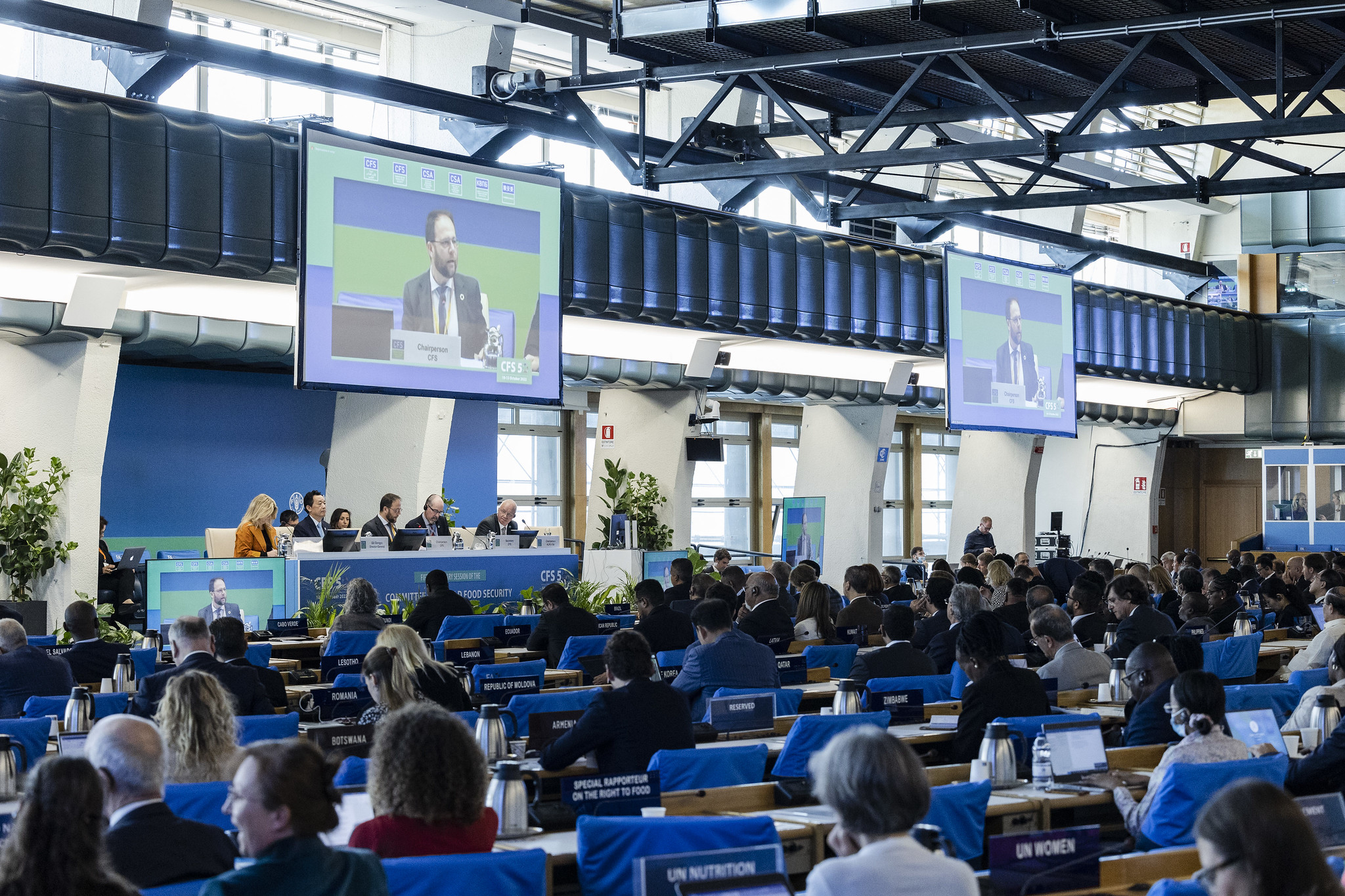The 50th Plenary Session of the Committee on World Food Security (CFS 50) concluded yesterday after a four-day event in which all stakeholders working on Food Security and Nutrition came together to discuss a wide array of issues, from coordinating policy responses to the global food crisis to promoting youth engagement and employment in agriculture and food systems as well as boosting responsible investments in sustainable agriculture and food systems.
Elizabeth Nsimadala, in her role as WFO Board Member for the African Constituency, was in Rome at FAO Headquarters to represent the World Farmers’ Organisation (WFO).
In a nutshell, here is what happened!
Highlights from the Plenary
Monday, 10 October 2022 | Full-Day – Ministerial Segment “Coordinating policy responses to the global food crisis – The State of Food Security and Nutrition in the World 2022”.
Elizabeth Nsimandala addressed the Ministerial Segment on policy responses to the global food crisis on behalf of the farmers of the world to highlight that “with no farmers, there can be no sustainable food systems”.
She then remarked on the importance of listening to farmers’ constraints, needs and suggestions to effectively build more sustainable, fair, and equitable food systems and reach Zero Hunger: “If we don’t create the right and fair conditions for farmers to get incomes and increase
Watch the full video recording HERE
Other Relevant Sessions
Wednesday, 12 October 2022 | 18.30-19.45 CET – Side Event 21 “Improving Global Food Systems Risk Management for a Resilient Food Future”
WFO Secretary General Arianna Giuliodori brought the farmers’ perspective into the debate on what is needed to build more stable, crisis-resilient global food systems.
Co-hosted by the Food and Land Use Coalition (FOLU) and The Club of Rome, the side event featured the participation of David Nabarro, Special Adviser to the UN Secretary-General and Strategic Director, 4SD – among others relevant speakers.
The side event was the occasion to explore how we can build off existing global governance mechanisms and frameworks to better monitor and manage food system risks in face of compounding crises and disruptions and mobilize commensurate policy responses so that instead of lurching from crisis to crisis and sticking to short-term fixes, we lay the foundations for a truly resilient system for the long-term.
The WFO Secretary General, Arianna Giuliodori, started her speech by underlining a dramatic paradox: many farmers (those who produce food for all) belong to the many millions of food-insecure.
She then remarked that “We need a farmer-centric approach to succeed. This doesn’t mean farmers hold all the answers, but they must be engaged. We need investments for a conducive environment where farmers are solutions providers, not just beneficiaries of someone else help.”
In this spirit, the World Farmers’ Organisation has been invited to be part of the GCRG (Global Crisis Response Group) to represent the farmers’ constituency by providing direct information and inputs on the impact of the Ukraine crisis at the farm gate worldwide and the solutions that Farmers have implemented with resilience: “farmers are sitting at the table through WFO, sharing simple solutions that, if validated and accepted by the system, could provide at least a piece of the solution.”
Watch the full video recording HERE
Thursday, 13 October 2022 | 8:30 – 9:45 CET – Side Event 26 “Imagine a future where new generations and ecosystems thrive: making the national pathways to sustainable food systems the accelerator for SDGs”
Co-organised by FAO, Food Systems, Land Use and Restoration (FOLUR), International Dairy Federation (IDF) and WFO, the session aimed to explore how to accelerate SDGs through national pathways to sustainable food systems.
Elizabeth Nsimadala took part in the discussion to highlight the role of global farmers’ organisations such as WFO to secure a future where new generations and ecosystems thrive.
She started by recalling that in 2021, on the occasion of the Un Food Systems Summit (UNFSS), food producers across the globe joined forces and adopted the Food Producers Declaration to reiterate that farmers are drivers of solutions towards sustainable food systems.
The Food Producers Declaration calls for urgent and concrete actions to drive systemic change that put farmers at the centre as people and economic actors, to rebalance power in the value chain and enhance farmers’ resilience.
The declaration reiterates the need for strong, empowered farmers’ organisations at all levels to ensure a solid independent farmers’ voice.
Then, Ms Nsimadala remarked that “The only path towards fairer and more nutritious food systems is by supporting a diversity of production systems and methods, putting farmers and producers, including women and youth, at the centre” and that “Strengthening Farmers’ Organisations is a crucial step in the way forward, as well as engaging them in the national pathways and coalitions for the UNFSS implementation starting from the local to the global level.”
She also shined a light on the need for young farmers to be supported and empowered to be able to engage in farming and recognize it as a profitable (and therefore sustainable) profession and see themselves as entrepreneurs: “they have a vision, they embrace innovation and technology, and they know how to dream big”.
Youth empowerment means not only supporting them financially. It must include education, sharing knowledge, investing in skills and capacity building, creating jobs, providing support and allowing youth to organise, lead initiatives and co-create policies and programs.
To summarise, the WFO Board Member for the African Constituency called on governments for:
- Enabling youth engagement in agriculture.
- Facilitating youth access to education, training and technology.
- Ensuring sustainable generational renewal.
- Including young farmers in decision-making processes.
watch the live recording here: https://youtu.be/Q0U_v6oNiNQ
Read more on the WFO advocacy work with and for young farmers of the world at the following link
